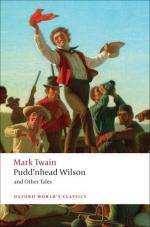It was human nature to want to get these riches, and I fell. I lied about the pin—advertising one when there wasn’t any. You would have done it; George Washington did it, anybody would have done it. During the first half of my life I never knew a child that was able to rise about that temptation and keep from telling that lie. Up to 1867 all the civilised children that were ever born into the world were liars —including George. Then the safety-pin came in and blocked the game. But is that reform worth anything? No; for it is reform by force and has no virtue in it; it merely stops that form of lying, it doesn’t impair the disposition to lie, by a shade. It is the cradle application of conversion by fire and sword, or of the temperance principle through prohibition.
To return to that early lie. They found no pin and they realised that another liar had been added to the world’s supply. For by grace of a rare inspiration a quite commonplace but seldom noticed fact was borne in upon their understandings—that almost all lies are acts, and speech has no part in them. Then, if they examined a little further they recognised that all people are liars from the cradle onwards, without exception, and that they begin to lie as soon as they wake in the morning, and keep it up without rest or refreshment until they go to sleep at night. If they arrived at that truth it probably grieved them—did, if they had been heedlessly and ignorantly educated by their books and teachers; for why should a person grieve over a thing which by the eternal law of his make he cannot help? He didn’t invent the law; it is merely his business to obey it and keep still; join the universal conspiracy and keep so still that he shall deceive his fellow-conspirators into imagining that he doesn’t know that the law exists. It is what we all do—we that know. I am speaking of the lie of silent assertion; we can tell it without saying a word, and we all do it—we that know. In the magnitude of its territorial spread it is one of the most majestic lies that the civilisations make it their sacred and anxious care to guard and watch and propagate.
For instance. It would not be possible for a humane and intelligent person to invent a rational excuse for slavery; yet you will remember that in the early days of the emancipation agitation in the North the agitators got but small help or countenance from any one. Argue and plead and pray as they might, they could not break the universal stillness that reigned, from pulpit and press all the way down to the bottom of society—the clammy stillness created and maintained by the lie of silent assertion—the silent assertion that there wasn’t anything going on in which humane and intelligent people were interested.
From the beginning of the Dreyfus case to the end of it all France, except a couple of dozen moral paladins, lay under the smother of the silent-assertion lie that no wrong was being done to a persecuted and unoffending man. The like smother was over England lately, a good half of the population silently letting on that they were not aware that Mr. Chamberlain was trying to manufacture a war in South Africa and was willing to pay fancy prices for the materials.




